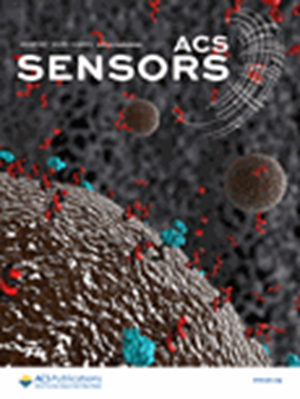A Superb Antifouling Electrochemical Biosensor Based on Macrocycle Encapsulation Strategy for Biomarker Analysis in Complex Biofluids.
IF 9.1
1区 化学
Q1 CHEMISTRY, ANALYTICAL
引用次数: 0
Abstract
Conquering microenvironmental interferences and achieving high sensing performance are challenging in biomarker analysis within complex biological fluids due to electrode biofouling and enzymatic degradation. Herein, a robust sensing interface was developed via a host-guest interaction strategy, where a peptide recognition unit (specific for Furin protein in this study) was encapsulated by a giant macrocycle to enhance antifouling and proteolytic resistance. The peptide could be effectively complexed with the designed large-sized water-soluble quaterphen[4]arene sulfate (WQP[4]S) through host-guest molecular recognition to resist protease hydrolysis and improve the stability of the peptide. At the same time, the complex formed by WQP[4]S and the peptide demonstrated high water solubility and electrical neutrality, thus providing an excellent antifouling performance for the sensing interface. In addition, methylene blue (MB) was introduced as an inter-reference molecule to develop a ratiometric electrochemical biosensor for highly accurate analysis. The WQP[4]S-modified peptide-based biosensor exhibited high selectivity and sensitivity for precise Furin detection and achieved a low detection limit of 0.81 U L-1, and it assayed Furin targets accurately in blood samples from both healthy individuals and patients with diabetes. This study presents a novel and effective approach to develop antifouling and enzymatic-resistant biosensors for precise biomarker detection in complex biological fluids.基于大环封装策略的高性能防污电化学生物传感器用于复杂生物流体中生物标志物的分析。
由于电极生物污垢和酶降解,克服微环境干扰并实现高传感性能对复杂生物流体中的生物标志物分析具有挑战性。在此,通过主客体相互作用策略开发了一个强大的传感接口,其中肽识别单元(在本研究中特异性针对Furin蛋白)被一个巨大的大环封装,以增强防污和蛋白水解能力。该肽可与设计的大尺寸水溶性季苯[4]芳烃硫酸酯(WQP[4]S)通过主客体分子识别有效络合,抵抗蛋白酶水解,提高肽的稳定性。同时,WQP[4]S与肽形成的配合物具有较高的水溶性和电中性,为传感界面提供了优异的防污性能。此外,引入亚甲基蓝(MB)作为对照分子,开发了一种高精度的比例电化学生物传感器。WQP[4] s修饰肽基生物传感器对呋喃的精确检测具有较高的选择性和灵敏度,检测限低至0.81 U L-1,可准确检测健康人和糖尿病患者血液样品中的呋喃靶点。本研究提出了一种新颖有效的方法来开发防污和抗酶的生物传感器,用于复杂生物流体中的精确生物标志物检测。
本文章由计算机程序翻译,如有差异,请以英文原文为准。
求助全文
约1分钟内获得全文
求助全文
来源期刊

ACS Sensors
Chemical Engineering-Bioengineering
CiteScore
14.50
自引率
3.40%
发文量
372
期刊介绍:
ACS Sensors is a peer-reviewed research journal that focuses on the dissemination of new and original knowledge in the field of sensor science, particularly those that selectively sense chemical or biological species or processes. The journal covers a broad range of topics, including but not limited to biosensors, chemical sensors, gas sensors, intracellular sensors, single molecule sensors, cell chips, and microfluidic devices. It aims to publish articles that address conceptual advances in sensing technology applicable to various types of analytes or application papers that report on the use of existing sensing concepts in new ways or for new analytes.
 求助内容:
求助内容: 应助结果提醒方式:
应助结果提醒方式:


